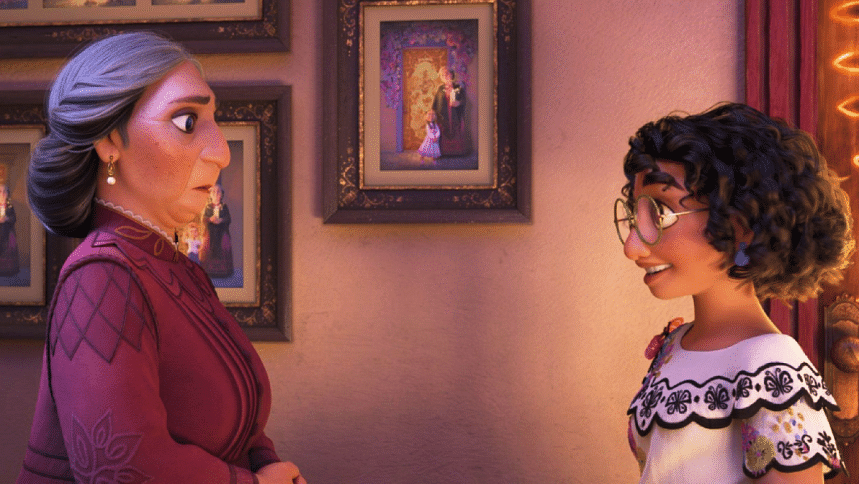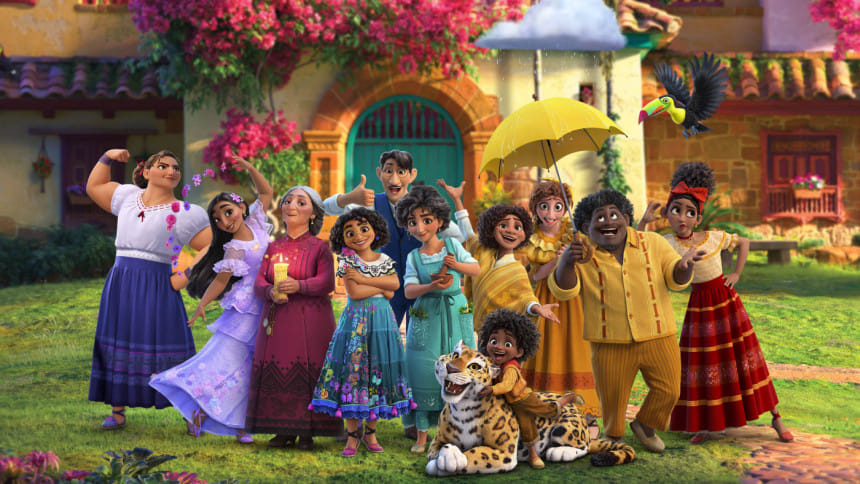Exploring generational trauma and familial expectations in Disney’s Encanto

Underneath the bright and cheerful surface of the narrative of Disney's latest musical, Encanto, lies a darker truth about the after-effects of the Colombian civil war, generational trauma, and the heavy burden of familial expectations.
Encanto opens with Mirabel, the empathic yet somewhat awkward main character, introducing her magical family known as the Madrigals. Surrounded by family members who can do everything from conjuring flowers and snowstorms to even healing people with their food, Mirabel feels out of touch and often left out. Perhaps because of Mirabel's close-yet-far proximity to her family, it's no surprise that she sees the growing cracks in her family's foundation – metaphorical and literal – and attempts to save them from it.
Amid the bright colours and toe-tapping musical numbers, the movie features Disney's first all Latinx cast, capturing the complicated intergenerational misunderstandings and staggering weight of expectations resulting in trauma. Each Madrigal is given a responsibility that they are expected to uphold at all costs, even their mental health. We see the Madrigals suffer from hypervigilance, insecurity, social anxiety, low self-esteem and self-confidence, depression, and more.
Having suffered the trauma of losing her husband and her home as a young mother due to civil unrest, the family's matriarch, known to all as Abuela, becomes trapped in the idea of upholding their place in society. She fears the loss of her place and home in society otherwise. She loses sight of her family's happiness and fails to realise that they are human beings who want to change and explore new possibilities as they grow.

As a result, Abuela now has exceedingly high expectations for her family. Anything out of the norm, like Isabella and Luisa doing anything out of their predetermined roles, sets her off. Her trauma results in her being short-sighted and retreating into what she knows to be true, like a cocoon.
Abuela remains in denial of bringing her house down until Mirabel opens her eyes to it. It is only when Mirabel breaks this cycle of abuse and helps each family member accept themselves for who they are that we see the Madrigals begin their life anew.
While the story is inspired by and based on the Latinx experience, we can't help but feel that some parts of the story ring true for South Asians. We, too, have often faced the burden of living up to our family's expectations, the burnout that results from being a former gifted child, and proving our worth by being of service to others.
Encanto's story is one we can relate to and understand on a personal level. It shows the struggles of older siblings having to bear the family's burden until they feel like they will crack under pressure, and gifted siblings being put on a pedestal they cannot deviate from. It shows the struggles of the weirdos, the oddballs, the misunderstood black sheep of the family, and the struggles of those that are left out.
Magical and fantastical, but at its core, Encanto is a story of a family trying to support each other and make their own place in the world – one we can all connect with and relate to. Encanto is a story of letting go of the past to discover one's true potential. It is a story of belonging.

 For all latest news, follow The Daily Star's Google News channel.
For all latest news, follow The Daily Star's Google News channel. 








Comments